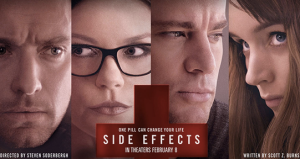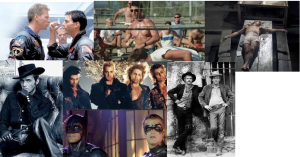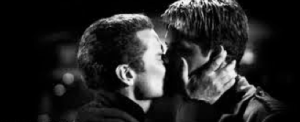Category: Film
“It always seems impossible until it’s done.”
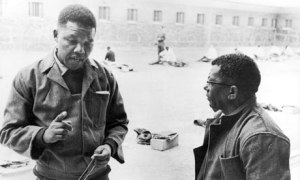 How to begin? Over the past day or so, across the globe, across all sections of all kinds of societies, the voice of individual after individual has paid testimony to the profound significance of Nelson Mandela’s life, and death. Crowds have gathered to sing and dance and celebrate, emulating in their actions the idea of solidarity and shared humanity that his life came to symbolise. I wonder if there is any more I can add to the general outpouring of goodwill of a scale and breadth that it is impossible to imagine any other political figure inspiring.
How to begin? Over the past day or so, across the globe, across all sections of all kinds of societies, the voice of individual after individual has paid testimony to the profound significance of Nelson Mandela’s life, and death. Crowds have gathered to sing and dance and celebrate, emulating in their actions the idea of solidarity and shared humanity that his life came to symbolise. I wonder if there is any more I can add to the general outpouring of goodwill of a scale and breadth that it is impossible to imagine any other political figure inspiring.
The death of Margaret Thatcher earlier this year prompted an immediate blogpost on my part. With no time to think it came out as an emotive stream of consciousness – it was easier to write. This time, life and work has forced a delayed response, and that delay seems to demand a thoughtful, considered approach that I don’t quite know how to achieve. Conjuring Thatcher, of course, is not just about her also having died this year, and it is not just about her also having been a towering political figure of our historical moment, and it’s not just about her having dismissed the ANC as a terrorist organisation and having opposed sanctions as a crime against free trade. And it’s not just that the absence of human empathy, which places those Thatcherite ideals of personal wealth accumulation and economic liberalism above all else, is in such stark contrast to the quite extraordinary ideals of truth, reconciliation and bipartisanship which led South Africa’s peaceful transition from apartheid to democracy. For people like me, figures like Mandela and Thatcher, and the events and moments connected with them, have somehow and somewhere along the way coalesced in our brains or our memories to forge and shape our characters, our attitudes, our belief systems, our moral compasses.
What I want to say is that for me Mandela symbolises the idea that there are some things which are so straightforwardly abhorrent that the only possible human response is to resist them. When it came to the South Africa which existed at the time I was becoming politically aware these things were not difficult to recognise – apartheid was so obviously a moral fucking outrage. It had its fair share of apologists and, of course, there were those who were happy to turn a blind eye to its atrocities in the name of making a quick buck – do we all recall Status Quo and Queen playing Sun City, Barclays Bank’s infamous investments, or indeed those of our late Prime Minister’s late husband Dennis Thatcher? But for many of us, it was clear that feigned ignorance was no possible response. We weren’t in South Africa, we weren’t facing the relentless daily degradation of apartheid. We were on the other side of the world, but their struggle felt like our struggle (I guess that’s what empathy means) and it seemed important to do something, however small. So we refused to buy South African produce. We stood vigil outside South Africa House. For years. We went on demos, we went to gigs, we sprayed slogans. Eventually history caught up with us, and when it did, and when from a cold 1990 February day in the UK we watched Mandela walk free from prison, we were moved beyond words. And proud to have been on the right side of history. And we understood the power of solidarity.
Mandela’s final steps towards freedom were accompanied by the unseen ghosts of those who hadn’t made it: Steve Biko and the countless others who had ‘died’ in custody, the children of Soweto who had been gunned down so mercilessly on the streets of their township, all those whose lives had been cut short by the regime. All those who had shown the kind of courage and dignity in their resistance that we all hope we would be capable of. We’ll never know, of course, unless we are tested. And who wants to be tested like that? We need our Mandelas to help us tell our stories and understand our histories, we need those human beings in our world who can rise beyond the ordinary to achieve the extraordinary, and Mandela was without doubt an exceptional human being. But we should not try to sanctify him, and we should remember that all of those people who gave their lives in the struggle against apartheid were potential Mandelas. When Mandela walked out of prison he carried their hopes and dreams with him.
When Thatcher said that there was no such thing as society she was wrong. There is nothing but society. None of us is self-sufficient, everything we do, or buy, or use, or think, or love is connected to someone else. It is how the human race has constructed itself. Perhaps today, in our increasingly complex and global society, it is not so easy to recognise those things that are straightforwardly abhorrent – perhaps challenging or changing or resisting them is not so straightforward. How will history judge, for example, our embracing of neo-liberal economics when every time we buy ‘competitively’ priced goods we are tacitly condoning child labour and sweatshop conditions somewhere else in the the world? These are complicated times. Let’s remember, though, that Nelson Mandela was not some kind of straightforward Christ-like figure. Yes, with his capacity for dignity and moral courage, decency and compassion, forgiveness and empathy, he has come to symbolise the best of humanity. But he was also a fighter, a thinker and a political strategist. Perhaps the best way to honour his life would be try like hell to harness all of these traits and direct them at the profound social injustices which taint our world today.
In the meantime let’s celebrate his life and take a little trip down memory lane.
Shivers down your spine
Antartica. 14 million square miles of cold. 90% of the world’s ice. Blizzards like nowhere else on earth. Land of magnetic attraction to heroes and fools alike. Land of no return: “I am just going outside and may be sometime.” Antartica has no indigenous population – but it does have scientific bases dotted across its vast land mass, staffed at any one time by between 1000 and 5000 thinly spread workers. And there is no government. There are a few treaties of course, a lot of goodwill, and a fair amount of plain hope that none of the temporary inhabitants will go stir buggin crazy in all the white light. And maybe set out about a cabin fever killing spree. Or that in the vast expanse of nothingness, mysterious activities are not afoot. Waiting to catch you. When you’re all alone.
The perfect backdrop, wouldn’t you say, for a psychological thriller. Or even better, a hammy horror. You wouldn’t be the first to think this, of course. B-movie directors worked this out some time ago and gave us, perhaps most notably, The Thing in 1982. You’ve gotta love a bit of John Carpenter.
And then, unfortunately, gave it to us again, in prequel form, in 2011.
Now, it seems some folk with their hands on a movie camera have gone one step further and actually shot a film in Antartica. The first feature set in the great white wilderness to have also been filmed there. The logistics of this would be unthinkable for any ordinary outfit. But this film, South of Sanity, was made entirely by workers on a research base: writer, director, cast and crew alike. Isolated workers on an isolated research base. Playing isolated workers on an isolated research base.
Ok, so it might seem a little amateurish, but I’d like to catch a glimpse of this little work of art anyway. If I was holed up on an Antarctic base right now I might be just a little bit creeped out. I might be looking over my shoulder. Watching. Listening. Waiting. For life to imitate art…
Annie Get Your Gun
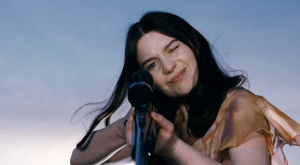 I know I probably shouldn’t trouble my little head with this stuff, but a little thought has been bubbling away in my little brain and has reached boiling point. So I thought I’d lift the lid and share it with you all. Before I explode.
I know I probably shouldn’t trouble my little head with this stuff, but a little thought has been bubbling away in my little brain and has reached boiling point. So I thought I’d lift the lid and share it with you all. Before I explode.
This thought I’d like to share has to do with films I’ve seen so far this year. Now, I’ve seen a lot, so I’m going to confine myself to those I’ve seen at the cinema, on the big screen, and paid good money for. And I’ll narrow the field further to talk only about mainstream, narrative, big new releases. Because, when I think about these films, I see a pattern emerging. Perhaps you’ll see it too?
First up was Life of Pi, all earnest and shiny and 3D and jumpy out of the screen. And I guess it was all right. If you like that sort of thing. I don’t much. And as it was adapted from a book there were externally imposed limitations, so there’s really no need to be irritated by the pretty, dancy girlfriend, or the mother/zebra whatever, or the wife whose role is to wander on set, once, weighed down by children, and do nothing. So I wasn’t.
But then I went to see Lincoln. Regular readers of this blog may already have formed a strong opinion of my strong opinion about this film. New readers, if you’re still with me by the end of this post, might want to check out Am I missing the point of facebook? or Why Lincoln is crap. Maybe Spielberg was able to resurrect Freud and get him to do a bit of moonlighting as the script advisor. Mrs Lincoln emerges as a textbook hysteric. Thank God Abe is around to help her steer an even course. And then there’s the stoic freed slave who pops up from time to time observing the men do their politics, or accompanying the mad Mrs Lincoln somewhere, or whispering with Mr Lincoln, a symbol of just how very wise and decent he is. And reminding us, through her remarkable absence of presence, just how non-threatening good ole black folk can be. Especially black women. And then, as if to drive the point home, there’s the housekeeper. The one who mops the furrowed brow of Tommy Lee Jones and so much else besides. Who doesn’t get to be at all angry about the state of her world.
And then, the following week, I found myself up close and personal with Django Unchained. Which I loved. Except, it’s a bit long and goes a bit off course in the final stretch. But still, I thought it was great. Except, well, there’s Broomhilda. Who’s lovely ‘n’ all, and it’s great that Django wants to rescue her. But the thing is, she’s a runaway slave. A repeat offender runaway slave. And the film makes the barbarous treatment a recaptured runaway slave is likely to receive explicitly and uncomfortably clear. So I think we have to assume that Broomhilda has balls, colloquially speaking. Which makes her quivering lipped, fainting behaviour a little out of character. But, perhaps, defensible. What is not defensible, no really, Quentin, it’s not, is her sitting astride a bloody great horse in the final moments of the film, holding a bloody great double barreled shotgun, which we can assume is bloody well loaded, whilst waiting helplessly for Django to do his thing.
Next was Arbitrage. I don’t know what to say really. Other than that I’m very glad my local cinema has a bar, so that I had alcohol to help me get through the tedium. And so we have the wife. Who doesn’t work, of course. But that’s ok because she does lots of charity stuff. And she gets to take a bit of control at the end of the film. And the mistress. Who’s a painter. But not very good. But that’s ok because he bankrolls her. Thankfully she gets killed off in a car crash fairly early on. She doesn’t actually get to drive the car, of course. And the daughter. Who works for him. And works out that he’s a fraudulent swindler. Because she’s got a brain. But she doesn’t get to do anything about it. And then there’s the dead driver’s son’s wife. Who gets to be supportive.
And so to Side Effects. Again, regular readers will be aware of my response to this film. A previous post, Side Effects? Of what? Lesbian sex? pretty much sums it up. But, to give the film its due, at least all the women in it actually do stuff. And at least they can actually claim to be principal characters. And its much more fun watching evil lesbians going about their evil business than virtuous non-entities, well non-entitying. If you know what I mean.
And finally there was Stoker. It’s not a great film, but if you like a bit of gothic (which I do), and you find watching Nicole Kidman’s face not move strangely fascinating (which I do), and you have have a thing for intense, odd-ball actresses (which I do) then it might be up your street. But really, I liked it for its blackly comic ending. It’s a strange old world, though, when you find yourself jumping for joy in a darkened cinema as the eighteen year old protagonist (and there’s the key word) offs a cop. Jumping for joy just because she actually GETS TO DO SOMETHING.
Imagine… if we really were all in this together
I’m not about to go all John Lennon on you. Fan that I am, now isn’t the time to channel some self-indulgent, long-haired hippy in a white bed. But, to coin a phrase, Imagine… Imagine living in a country at near economic collapse. Imagine a chronic housing shortage. Sounds familiar, right? Now imagine, and please stick with me here readers, I know this is a leap of faith, but imagine a response which says something like: let’s build houses. No, not houses, homes. That way people will have somewhere to live. Somewhere to live well. Somewhere reasonable. Somewhere decent. Somewhere they can afford. And people can be employed to design and build these houses. Then more people will have jobs. And that will be good for the economy. And you know what, while we’re at it, let’s imagine a universal healthcare service, from the cradle to the grave. Free at the point of delivery. Because we’re all in this together. And because we’re all in this together, and we’re essentially social creatures, let’s imagine that we build libraries and cinemas and swimming pools… Just imagine.
And so Ken Loach gives us The Spirit of ’45. And it tells the story of a time when people imagined all this and more, and made it happen. Not perfectly, but with vision. Because we were all in this together. Go and see the film. It’s moving. And inspiring. And enraging. It ain’t subtle, but with the Bullingdon Club and their acolytes, aided and abetted by political technocrats of every hue, selling off the family silver, ours not theirs, now isn’t the time for subtlety.
Now is the time to say GET YOUR HANDS OFF OUR NATIONAL HEALTH SERVICE. And give back those bits you’ve flogged off already. And while you’re at it, we’d like our railways back. And our energy, so some smart people can actually plan an energy policy that might have the slightest chance of success. And our postal service. And every other essential service that you and your predecessors have given away without so much as a by your leave. But you know what, we’re reasonable people here, we wouldn’t want you to leave empty handed. Tell you what, why don’t you take THAT INSANE BANKING SYSTEM and those HIGHER RATE TAX EVADERS, that you’re so bloody fond of, with you when you go?
Real Vampires Don’t Sparkle… but maybe that’s the point
Ok, I can’t quite believe that I’m going to attempt this. Perhaps I should start with a disclaimer. I love Gothic fiction. I’m a big fan of the horror genre in film. I particularly love vampire flicks, and I like my vampires to have fangs. I’m interested in film. Interesting film. I’m interested in literature. Interesting literature. I consider myself a feminist. I say all this, and I could say so much more, as a kind of begging for forgiveness in advance. Because, what I’m about to do, and I can’t quite believe it myself, is offer a kind of apology for The Twilight Saga. No. More than that, offer a reason for its popularity. And more than that, suggest that, despite its deeply suspect ideology, it’s not so bad really. Bear with me, readers.
I ought to make it clear, I haven’t read a single word of a single one of the Twilight books. I don’t intend to. I probably wouldn’t like them. Which is fine. I’m fairly certain I’m not the target audience anyway. I have, however, over the past couple of weeks, watched all five of the films. I thought it was about time to have a look at just what it is, precisely, that has been preoccupying the kidz over the past few years. Or at least, that’s what I tell myself. My initial reaction was one of horror. The wrong kind of horror. I watched the films in the wrong order, starting with Breaking Dawn: part 1, which with its unflinching pro-life subtext (actually not so much of the ‘sub’) left me fearing for the ideological hearts, not to mention the psychological, and indeed physical, well-being of our teenagers. And then there’s the stalking, controlling, coercive boyfriend. And the mind games. And the ‘no sex before marriage’ clause. And the heroine seemingly free from any agency at all. And Wolfy (sorry, Jacob) imprinting on a new born babe – I’ve tried like mad to rationalise this one, but really, whichever way you look at it, it’s just creepy. And. And. And…
And what about adding to the body of Vampire mythology? Harmless ‘vegetarians’? Repeating high school ad infinitum? Driving around in Volvos and Mercedes? Living in (unaccountably affluent) peace in a Scandinavian style lodge? It’s not that this is all a bit off canon, so much as this is all a bit lame. And then there’s the sparkling. Sparkling, I tell you. Vampires don’t sparkle. They chow down on your neck with bloody great fangs. They exist as a metaphor for sex, repression, fear, desire. They offer a safe space for transgression. They explore the other. They explore the id. They DON’T BLOODY WELL SPARKLE.
But then maybe that’s the point. Maybe Edward, in all his toothless, sparkling glory is so non-threatening that the sinister undercurrents of his behaviour are rendered utterly meaningless. Maybe the adolescent and the pre-pubescent fans buy into the unreconstructed gender fantasy because it so clearly is fantasy, and requires so little exertion on their part. Maybe, surrounded as they are by a hyper-sexual, disposable culture, the innate conservatism of The Twilight Saga offers some breathing space. Maybe they just fancy Robert Pattinson. Or Kristen Stewart. Maybe they’re frightened of growing up, and they find something reassuring in Bella and Edward achieving a state of stasis while still teenagers. Or maybe they like waiting ’til the final film for Bella to actually get some muscles – a kind of delayed gratification.
Or maybe I should give up the ghost and direct you to this biting Buffy/Twilight mashup instead…
Thanks for the reminder that Real Slayers Stake Vampires. Especially if they sparkle.
Google ‘real vampires don’t sparkle’ and click on images. Go on, it’s fun.
Many thanks to Shannon for the lightbulb moment. Cheers.
Side Effects? Of what? Lesbian sex?
Spolier alert. Evil lesbians’ evil plan foiled by super sleuth Law. Hetero-hegemony restored and all is well with the world. Phew!
Am I alone in being somewhat thrown by Soderberg’s latest? To be honest I thought I was about to see a pharma-thriller of some sort, perhaps an exploration of drug company corruption, or fraught examination of a descent into moral ambiguity, you know, that sort of thing. And to be honest, that’s kind of how the film started out. And then it seemed as if, at some point, someone did a nifty script exchange. And didn’t tell anyone. And no-one noticed.
Don’t get me wrong, I’m a big Soderberg fan. He knows how to entertain. And this schlocky thriller looks great, sounds great and is a tremendous amount of fun. A barrel of laughs you might say. So much so, that we were rolling round in the isles, pretty much paralytic with mirth, by the time the final credits rolled. Casting Channing Tatum was a master-stroke, although I have to confess I didn’t know who he was until this evening, and I’m not convinced I’ll be able to remember who he is tomorrow morning. And isn’t that a girl’s name anyway? Never before have I witnessed someone on screen so totally forgettable that Jude Law emerges from the void a charismatic scene-stealing dynamo. Catherine Zeta Jones and Rooney Mara are immensely watchable, and look great too, which evil lesbians really ought to if they possibly can. Amazingly though, given the fine acting capabilities of these two, as well as their unfair share of God-given good looks, their pseudo-sex scene that allows for the denouement of film is spectacularly unconvincing. What a shame.
I really can’t object to Catherine Zeta Jones being cast as a femme-fatale. She does the job admirably. And why not write her character as a lesbian? And why not have her character have a relationship with Rooney Mara’s character? And why not write these characters as cunning, amoral schemers who ultimately get their comeuppance? Except, well, wouldn’t it be nice if, you know, just occasionally, the hero happened to be a lesbian character. And could, just maybe, have sex with another lesbian character, not as part of an evil plan, but just coz they happen to, you know, feel like it. And maybe the sex could go unpunished. You know, just occasionally. Occasionally…
Come on Soderberg, don’t bow out of Hollywood just yet. Clearly you have more work to do.
Lock Up Your Daughters… Pulp’s In Town
I think, perhaps, I should stop making insulting comments about facebook in this blog and then linking it to my facebook account in the vain hope of ensnaring a reader or two. It’s not good form.
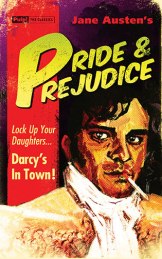 What is good, though, is that there’s a fabulous new publishing company in town: Pulp! THE CLASSICS. Its genius lies in its reprinting of select, classic bestsellers, all dolled up in pop-culture covers and ironic tag-lines. First up, of course, is Pride and Prejudice. Steamy blacks and reds mixed with pop-art yellows signal smouldering sex with just a hint of irony. I think. The tag-line reads “Lock Up Your Daughters… Darcy’s In Town!” The edition caught my eye in an instant, and I bought two, one for me (what can I say, I’m a fan, a fanatic, whatever…), and one for a pal with an eye for pop and the absurd, but who’s yet to be convinced of the wonderful worth of Miss Austen. I’m hoping to sneak her in through the side door with this version.
What is good, though, is that there’s a fabulous new publishing company in town: Pulp! THE CLASSICS. Its genius lies in its reprinting of select, classic bestsellers, all dolled up in pop-culture covers and ironic tag-lines. First up, of course, is Pride and Prejudice. Steamy blacks and reds mixed with pop-art yellows signal smouldering sex with just a hint of irony. I think. The tag-line reads “Lock Up Your Daughters… Darcy’s In Town!” The edition caught my eye in an instant, and I bought two, one for me (what can I say, I’m a fan, a fanatic, whatever…), and one for a pal with an eye for pop and the absurd, but who’s yet to be convinced of the wonderful worth of Miss Austen. I’m hoping to sneak her in through the side door with this version.
Of course, they got the tag-line wrong. If they wanted to go with the locks and daughters theme, it should have read, “Lock Up Your Daughters… Wickham’s In Town!” He is, after all, the one with a penchant for seducing 15 year olds. Where’s the fun in dwelling on technicalities, though? What’s more interesting is the enduring appeal, and the ongoing mythologising, of Darcy in the popular consciousness. On this cover, Darcy is Colin Firth, but Colin Firth as he might be cast as Dracula (Regency outfit aside), all lurking in the shadows and glowering menacingly, fag in mouth. Wait a minute. Fag in mouth? Well ok, so 50s alienated anti-heroes are also evoked – Rebel Without a Cause anybody? Or maybe there’s just a hint of our fave cigarette-smoking bad-boy vampire, Spike, in this little construction.
Anyway, for my money, this is a welcome addition to the publishing high street. Forthcoming editions will include Wuthering Heights and The Great Gatsby. Keep an eye on those daughters, now.
Unchained Melody
So, Twitter has been hacked and passwords stolen ‘n’ it’s all just so awful. On the plus side, if the hackers have got my details, I’d really appreciate a reminder coz I can’t keep any of my trillion or so passwords in my head. Can anyone?
After my ‘Lincoln’ induced rant last week (oh, and don’t get me started on ‘Life of Pi’ popping out of the screen at me like Disney on acid) my faith in cinema has been somewhat restored, though not entirely without reservation, by ‘Django Unchained‘. Thanks Jamie Foxx: dodgy moniker aside, you make a mean cowboy. I won’t go any further here as controversy enough surrounds this flick, and you can pick up reviews and follow microblog spats to your heart’s content all across cyberspace. Perhaps there’s a point to blogging.
However, this restoration of faith has been just a little shaken by the news that Steven Soderberg’s taking his leave of Hollywood. I understand that I’m a bit behind the times on this one, rumours have been circulating for a while, but I only caught up on the news a few days ago. I must admit to having a soft spot for Soderberg – who doesn’t love Clooney and J-Lo in the boot of that car? Does anyone know what make of car that was, anyway?
Perhaps he’s right, though – perhaps the really interesting work has migrated to television. Still, it seems a shame that while the House of Commons dragged itself into the 21st century and voted to legalise gay marriage last night, leaving the embittered entrails of Roger Gale splattered on the chamber floor (an added bonus), across the pond Soderberg says that Hollywood studios are still refusing to fund projects deemed too gay. So, I thought I’d put together an itsy, pretty montage of leading-man moments that inexplicably slipped beneath the studio bosses gaydar:
And let’s not leave TV out of the picture. No subtext here – this one’s for you Roger:
Am I missing the point of facebook? or Why Lincoln is crap.
Yesterday, after going cold turkey for 37 days (yes, I was counting), I reactivated my facebook account. Who knows what precipitated this move: a fear that a big party’s going on somewhere and I’m not invited? Nosiness? A nagging suspicion that if I’m no longer parading myself on my very own cyber-rag then I’m not really here at all? A messy flat and some reading that needs avoiding? Anyway, whatever the real reason, the one I gave was that I needed to re-emerge to tell the world how truly crap ‘Lincoln’ is.
And truly, it is. I mean Spielberg can put a slick film together, we all know that, and if painting by numbers is your thing, and you like those numbers to add up to a Jack Vettriano, then maybe you’ll go for ‘Lincoln’. I was left cold. And just a little irritated. Of all the complex stories that could have been told about the 16th President of the USA, the workings on Capitol Hill, the American Civil War and the abolition of slavery, this film seems to have opted for the most crassly simplistic, one dimensional, hero-worshipping, whitewashing one of all. Really, he should have stuck to sharks and aliens. Oh, and I liked that one about the truck.
Daniel Day-Lewis, all got up in comedy whiskers and a death-like pallor, chanelled his inner Atticus (Henry Fonda did better) while marginal, simple black folk look on in admiration. Or is it adoration? Really, 50 plus years ago when Harper Lee gave us such sorry representations of black characters in ‘Mockingbird’, we winced a bit, but let it pass. The civil rights movement was in its infancy, ‘black power’ hadn’t yet taken centre stage, in its own way the work was revelatory, and, importantly, the whole thing was couched in such sublime prose you’d forgive it almost anything. But you’d think in 2013, what with a black President ‘n’ all, a little human complexity could be given a voice. To be fair on the great SS though, this cartoonish representation isn’t reserved solely for his black characters: no-one really escapes the flattening. I expected Mickey Mouse to pop up with a frying pan at any moment and literally flatten the lot of ’em. At one point, an actual mouse did scuttle across the bottom of the screen, projecting a cheeky black shadow in its wake. Honestly. The Barbican really ought to contact pest control.
Back to the reactivation of my facebook account, though. The first thing I noticed was that my roll-call of friends had decreased in number. I had expected this, but what was marginally interesting is that I have no idea who the hell are no longer my facebook friends. Scroll down and stare as I might at image after image, the absent faces do not present themselves to my mind. Not revelatory, I know, but this does highlight the very particular nature of being a ‘facebook friend’. I took another look at my friends list and at a rough guess, I reckon that fewer than 20% of those on it are actually, in the traditional sense of “I like you, you like me, let’s sit in the pub and have a beer together”, friends. Am I missing the point of facebook?



